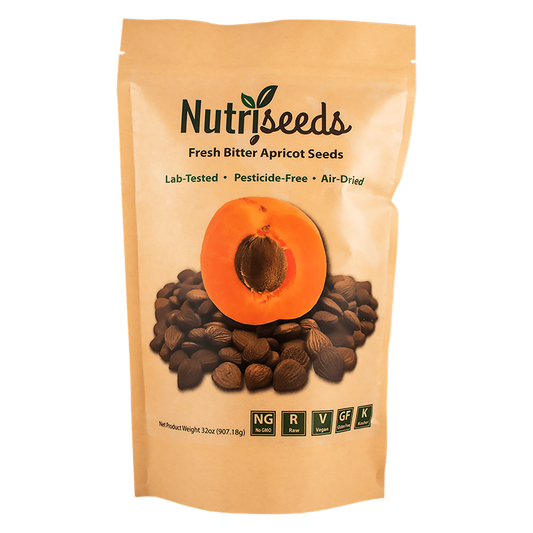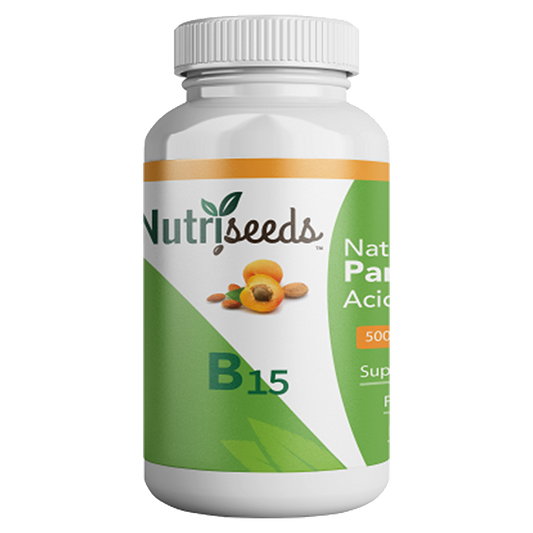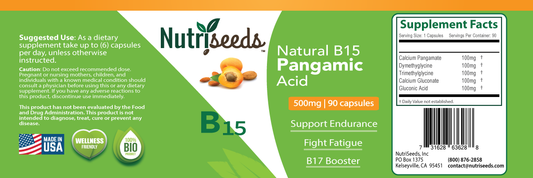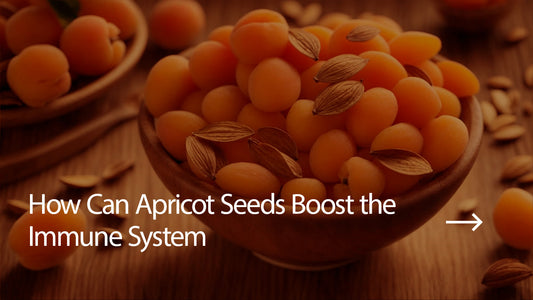
Enhancing Digestive Health With Apricot Seeds Benefits
Known by their scientific name, Prunus armeniaca, these seeds contain a wealth of nutrients, fibers, and compounds that have been linked with promoting healthy digestion, aiding in the reduction of inflammation, and fostering a balanced gut microbiota.
As gut health becomes increasingly recognized as foundational to overall well-being, exploring the potential of these tiny seeds becomes not just intriguing but essential.
Through a blend of traditional wisdom and modern science, apricot seeds offer a natural, yet powerful, avenue for enhancing digestive health.
In this article, we delve into the multifaceted benefits and uses of apricot seeds for gut health, illuminating a path to wellness that is both enriching and grounded in evidence.
Key Takeaways
1: Apricot Seeds Contain Essential Nutrients That Promote Gut Health, Including Dietary Fiber, Antioxidants, and Amygdalin.
2: Moderate Consumption of Apricot Seeds Is Crucial to Avoid the Risk of Cyanide Poisoning, With Recommendations Typically Suggesting No More Than Three Small Seeds Per Day.
3: Apricot Seeds Can Be Creatively Incorporated Into Meals to Enhance Their Nutritional Value and Support Digestive Wellness.
4: Scientific Research Supports the Beneficial Impact of Apricot Seeds on the Digestive System, Highlighting Their Role in Enhancing the Gut Mucosal Lining and Fostering Beneficial Gut Bacteria.
5: Personal Experiences With Apricot Seeds Suggest a Positive Impact on Digestive Health, With Emphasis on Starting With Small Amounts and Gradually Observing the Body's Response
Unveiling the Health Secrets of Apricot Seeds for Your Gut
Transitioning the focus towards the core of apricot seeds reveals a bounty of essential nutrients, poised at the brink of revolutionizing gut health.
Within these small yet potent kernels, lies a complex array of vitamins, minerals, and antioxidants that collectively forge a path toward enhanced digestive wellness.
The journey into apricot seeds' capacity to bolster gut health uncovers a fascinating interplay between these nutritional components and the body's intricate digestive system.
As the narrative unfolds, it becomes evident how these seeds not only nourish but also work diligently to maintain an equilibrium within the gut's ecosystem.

The Essential Nutrients in Apricot Seeds
Nestled within the heart of apricot seeds is a treasure trove of nutrients vital for gut health, among which are essential fatty acids, dietary fiber, and antioxidants. These components are instrumental in fostering a healthy digestive system, aiding in the reduction of inflammation, and supporting the body's natural detoxification processes.
Apricot seeds are also rich in amygdalin, known as vitamin B17, which interacts with digestive enzymes to release beneficial compounds that may contribute to the prevention of certain diseases. This unique chemical composition not only offers nutritional benefits but also plays a crucial role in maintaining the balance of gut microbiota, ultimately promoting overall gastrointestinal wellness.
How Apricot Seeds Promote Gut Health
Apricot seeds possess an extraordinary ability to influence gut health positively due to their high dietary fiber content. This fiber aids in the smooth movement of food through the digestive tract, helping prevent constipation and maintain a regular bowel movement. Furthermore, fiber’s role in nurturing beneficial gut bacteria underlines its importance in promoting digestive health.
Additionally, the anti-inflammatory properties of apricot seeds play a crucial role in gut health. They help reduce inflammation in the digestive system, which is vital for preventing and managing conditions such as inflammatory bowel disease. Through these mechanisms, apricot seeds ensure the gut remains healthy and functional:
- Enhancing regular bowel movement through dietary fiber.
- Nurturing beneficial gut bacteria with fiber.
- Reducing digestive system inflammation with anti-inflammatory properties.
A Guide to Incorporating Apricot Seeds Into Your Diet
Transitioning into practical applications, understanding the daily recommended intake of apricot seeds becomes crucial for harnessing their gut health benefits without exposing oneself to potential risks.
Recognizing the fine balance between beneficial and harmful effects is paramount, especially given the presence of amygdalin that can release cyanide in the body.
Hence, exploring creative ways to incorporate apricot seeds into meals not only enriches one's diet with essential nutrients but also ensures safe consumption levels are maintained.
This exploration offers a mosaic of culinary possibilities, transforming mundane meals into nutrient-dense, gut-friendly feasts that contribute significantly to digestive wellness.
Daily Recommended Intake of Apricot Seeds
The daily recommended intake of apricot seeds is a topic of spirited discussion among nutritionists and healthcare providers, primarily because apricot seeds contain amygdalin, which can transform into cyanide, a toxic compound, upon ingestion. It is generally advised that adults limit their intake to no more than three small apricot seeds per day to sidestep the potential risk of cyanide poisoning, underscoring the importance of moderation.
Guidance from health professionals suggests tailoring the consumption of apricot seeds to individual health statuses and conditions. For those considering adding apricot seeds to their diet, it is vital to consult with a healthcare provider to determine an appropriate and safe amount, especially for individuals with underlying health issues or those who are pregnant, to ensure they benefit from the seeds' nutritional value without compromising their health.
Creative Ways to Include Apricot Seeds in Meals
Transforming apricot seeds into a versatile culinary ingredient creates a realm of possibilities for enriching meals with their gut-friendly nutrients. By finely grinding the seeds into a powder, individuals can seamlessly blend them into smoothies, sprinkle over breakfast oatmeal, or even integrate them into homemade granola, offering a subtle, nutty flavor alongside a nutritional boost.
Another innovative approach involves infusing apricot seed oil into one's cooking, incorporating it into salad dressings or using it as a distinctive finishing oil for dishes. This not only imbues meals with the seed's health-enhancing properties but also introduces an exotic twist to the flavor profile, enriching the dining experience with both taste and nutrition.
Scientific Insights on Apricot Seeds and Digestive Health
As ongoing research shines a light on the relationship between diet and gut health, apricot seeds emerge as a subject of interest among scientists and nutritionists alike.
This section delves into the scientific underpinnings of apricot seeds' influence on digestive wellness, offering an overview of relevant studies and an exploration of the health-promoting compounds these seeds contain.
By examining the evidence, we gain insight into how apricot seeds may not only support but enhance the complex ecosystem within the gut, underscoring their potential as a beneficial addition to a health-conscious diet.
Overview of Studies on Apricot Seeds and Gut Health
Research into the impact of apricot seeds on gut health illuminates a promising path for digestive wellness. Studies underscore the seeds' role in enhancing the mucosal lining of the gut, which serves as a first defense against harmful pathogens and plays a critical role in nutrient absorption. The rich composition of antioxidants in apricot seeds, particularly amygdalin, has been observed to contribute to this protective effect, fostering resilience against digestive disturbances.
Further scientific exploration reveals that the dietary fiber found in apricot seeds aids in promoting regular bowel movements and maintaining a healthy balance within the gut microbiota. This synergy between apricot seeds' fibrous content and its bioactive compounds has drawn attention for its potential in mitigating inflammation and supporting the overall function of the digestive system. These findings offer a compelling argument for the inclusion of apricot seeds in a diet aimed at improving gut health.
Understanding the Health-Promoting Compounds in Apricot Seeds
Apricot seeds are a storehouse of amygdalin, often spotlighted for its controversial yet fascinating role in the prevention and treatment of various ailments. This compound, when metabolized by the body, can produce substances thought to be toxic, yet paradoxically, it is also credited with significant health-promoting properties, particularly in bolstering the body's defense mechanisms against malignancies and enhancing gut health.
Moreover, the presence of vitamins E and B17, alongside minerals such as magnesium and potassium within apricot seeds, underscores their nutritional value. These compounds collectively support the reinforcement of the gut's barrier, minimize oxidative stress, and encourage the flourishing of a healthy microbiota, pivotal for optimal digestive health.
Prebiotic Properties of Apricot Seeds: Boosting Good Bacteria
The exploration into the beneficial impacts of apricot seeds on gut health unveils their significant prebiotic properties, which play a pivotal role in nurturing and amplifying the population of good bacteria within the gut.
This subsection delves into the mechanisms through which apricot seeds, enriched with dietary fiber and essential nutrients, serve as prebiotics in the digestive tract, thereby creating a favorable environment for beneficial bacteria to thrive.
Such an environment is crucial for maintaining digestive health, optimizing nutrient absorption, and fortifying the body's defense against various ailments.
The discussion progresses to highlight how the inclusion of apricot seeds in one's diet can be a strategic move towards achieving a balanced and healthy gut flora.
The Role of Prebiotics in Gut Health
Prebiotics play an essential role in gut health by serving as food for beneficial bacteria, fostering a healthy balance within the gastrointestinal ecosystem. These non-digestible fiber compounds stimulate the growth and activity of advantageous microorganisms in the gut, which are crucial for digestion, immune function, and overall well-being. Apricot seeds, rich in dietary fiber, act as a potent prebiotic source, encouraging the proliferation of good bacteria and enhancing intestinal health.
In the complex world of gut microbiota, prebiotics like those found in apricot seeds help to maintain an environment conducive to the absorption of crucial nutrients and minerals. By supporting the growth of protective bacteria, prebiotics mitigate the risk of harmful pathogens establishing a foothold, thus playing a pivotal role in the prevention of gastrointestinal infections and diseases. This intricate interplay underscores the significance of apricot seeds' prebiotic properties in bolstering gut health and, by extension, reinforcing the body's defense system.
How Apricot Seeds Act as Prebiotics in Your Gut
Apricot seeds contribute significantly to gut health by providing a robust source of dietary fibers, which play a critical role as prebiotics in the digestive system. These fibers facilitate the nourishment of beneficial gut bacteria, crucial for enhancing the digestive process and strengthening the immune system. Through this mechanism, apricot seeds help create a more resilient and balanced gut microbiome.
In addition to fostering a healthy bacterial environment, the unique composition of apricot seeds, particularly the presence of certain antioxidants and vitamins, supports the reduction of inflammation within the gut. This anti-inflammatory action further aids in the maintenance of a healthy gut lining, which is essential for the optimal absorption of nutrients and the prevention of intestinal discomfort. Consequently, incorporating apricot seeds into a balanced diet can be a strategic way to improve overall digestive wellness.
Addressing the Side Effects: Balancing the Benefits and Risks
While the benefits of apricot seeds for gut health are increasingly recognized, it's crucial to also shine a light on their potential side effects to ensure a well-rounded understanding.
This consideration sets the stage for exploring the need to recognize possible adverse effects and establish guidelines for safe consumption.
Addressing these concerns head-on allows for an enlightened approach to incorporating apricot seeds into one's diet, maximizing their health benefits while minimizing risks.
It is this balance that ensures apricot seeds can be a viable and safe addition to promoting gut health and overall wellness.
Recognizing Potential Side Effects of Apricot Seeds
While apricot seeds hold promise for enhancing gut health, awareness regarding their potential side effects is essential for safe consumption. Chief among these concerns is the presence of amygdalin, which can decompose into cyanide, a potent toxin, when ingested. Moderate consumption in accordance with health guidelines minimizes this risk, yet it underscores the importance of informed dietary choices when incorporating apricot seeds into one's regimen.
Another aspect warranting attention involves individuals with specific health conditions or sensitivities, for whom apricot seeds may pose additional risks. For instance, those with compromised liver function may find it challenging to process the by-products of amygdalin metabolism efficiently, heightening the risk of adverse effects. Consulting with a healthcare provider before introducing apricot seeds or any new element into one's diet is advisable to prevent potential health complications.
Guidelines for Safe Consumption of Apricot Seeds
To ensure the safe consumption of apricot seeds, individuals are advised to start with a minimal quantity and observe their body's response. Recording any adverse effects, even if minor, is paramount for adjusting intake accordingly and preventing potential toxicity. This cautious approach allows for the benefits of apricot seeds to be enjoyed without undue risk.
Engaging with a healthcare professional before integrating apricot seeds into the diet emerges as a critical step, particularly for those with existing medical conditions or who are on specific medication regimes. This consultation ensures that the consumption of apricot seeds complements one's health rather than introducing complications, guiding a safer journey towards improved gut health.
Navigating Through Myths vs. Facts: Apricot Seeds for Gut Health
In the journey to harness the potential of apricot seeds for bolstering gut health, separating fact from fiction is paramount.
Misconceptions often cloud the truth behind what apricot seeds can genuinely offer for digestive wellness, leading to polarized views on their efficacy and safety.
This section aims to shed light on the reality by debunking common myths surrounding apricot seeds, while presenting the insights gathered from scientific research.
By clarifying what science actually says about the influence of apricot seeds on gut health, individuals can make informed decisions, steering clear of hearsay and focusing on the authentic benefits these potent seeds have to offer.
Debunking Common Misconceptions About Apricot Seeds
One prevalent misconception about apricot seeds is that they are outright harmful due to their amygdalin content, which can be metabolized into cyanide: a toxic substance. However, this perspective fails to consider the presence of beneficial nutrients and the fact that adverse effects are typically associated with excessive consumption rather than moderate, informed use.
- Apricot seeds contain amygdalin, which can be harmful in large quantities but is otherwise a source of nutrients.
- Moderate consumption following health guidelines minimizes the risk of cyanide poisoning, making apricot seeds a beneficial addition to a balanced diet.
Another common myth is that apricot seeds offer no real health benefits, especially concerning gut health. Scientific research, however, indicates that these seeds are a rich source of dietary fiber, antioxidants, and essential fatty acids, all of which contribute significantly to maintaining a healthy digestive system and fostering beneficial gut bacteria.
What Science Really Says About Apricot Seeds and Gut Health
Scientific investigations into apricot seeds have unveiled their promising role in supporting gut health, primarily through the enhancement of the gut mucosal lining and the promotion of a balanced gut microflora. Research points towards the rich array of dietary fiber, antioxidants, and vitamins present in these seeds as key to their ability to strengthen the intestinal barrier and foster an environment conducive to beneficial bacterial growth.
The compelling findings from recent studies suggest that, beyond their nutritional value, apricot seeds possess anti-inflammatory properties that might alleviate symptoms associated with digestive disorders. This research underscores the potential of apricot seeds in dietary strategies aimed at improving gut health, highlighting their contribution to a more efficient and resilient digestive system.
Personal Experiences on Improving Gut Health With Apricot Seeds
John, a middle-aged software developer plagued by chronic digestive issues, embarked on a health journey with apricot seeds after exhaustive research. Initially skeptical, he was amazed by the palpable change in his gut health: a significant reduction in bloating and enhanced regularity in his bowel movements.
- Embarked on a health journey with skeptical beginnings.
- Noticed a significant reduction in bloating.
- Experienced enhanced regularity in bowel movements.
Similarly, Emma, a fitness instructor, struggled with maintaining a balanced diet and managing the stress that negatively impacted her digestion. Incorporating apricot seeds into her daily routine, she witnessed a remarkable improvement in her digestion and overall energy levels, attributing this positive change to the seeds' nutrient-dense profile and their prebiotic properties.
Is it Safe to Eat Apricot Seeds Every Day?
Apricot seeds, often hailed as a radical component of natural therapy, have been a subject of debate among nutritionists and health enthusiasts alike. Known for their bitter taste, reminiscent of almonds, these seeds are a powerhouse of nutrients, including protein, vitamin C, vitamin A, and calcium, making them a seemingly perfect addition to a healthy diet. But is it safe to consume them daily?
Nutritional Profile and Benefits
Apricot seeds are rich in protein, essential for muscle repair and growth, and carbohydrates, which provide the body with energy. They are also a good source of vitamin C, known for its role in boosting the immune system, and vitamin A, essential for healthy vision and skin. The calcium content supports strong bones and teeth, while the seeds' water content helps in hydration, crucial for overall health.
Incorporating apricot seeds into your diet could contribute to weight management, thanks to their high dietary fiber content found in the dried fruit, which aids in digestion and promotes a feeling of fullness. Additionally, the presence of vitamin C and vitamin A can enhance skin health, making apricot seeds a popular ingredient in cosmetics for their anti-aging properties.
Potential Risks and Considerations
Despite their benefits, apricot seeds contain amygdalin, which can convert into cyanide, a potent toxin, in the body. This has raised concerns about their safety, particularly when consumed in large amounts. The question of whether it's safe to eat apricot seeds every day hinges on this risk factor. In small quantities, apricot seeds can be a part of a balanced diet, offering a unique blend of nutrients. However, it is crucial to limit intake to avoid potential toxicity.
Medicinal Use and Health Impacts
Traditionally, apricot seeds have been used in medicine, believed to fight cancer cells and lower blood pressure and cholesterol levels, contributing to heart health. However, it's essential to approach these claims with caution, as scientific evidence supporting the medicinal use of apricot seeds is limited and controversial.
Recommendations for Consumption
For those considering adding apricot seeds to their diet, moderation is key. It's advisable to consult with a healthcare provider, especially for individuals with underlying health conditions or those on medication, to determine a safe amount. Incorporating apricot seeds as part of a varied and healthy diet, rich in fruits like peach and apricot, as well as other dried fruits, can enhance nutritional intake without relying solely on apricot seeds for health benefits.
In short, while apricot seeds can be a nutritious addition to a healthy diet, offering benefits from weight management to improved skin health, their daily consumption requires careful consideration due to the potential risks associated with amygdalin content. Balancing their intake with a variety of other nutrient-rich foods and consulting with a healthcare professional can ensure that you harness the benefits of apricot seeds safely and effectively.
Lessons Learned and Tips From Those Who've Benefited
The journey through personal experiences and the incorporation of apricot seeds into one's diet underlines a unanimous lesson: moderation and awareness regarding potential side effects are paramount. Individuals who have integrated these seeds into their nutritional regimen stress the importance of starting with small amounts, keenly observing the body's response to avoid adverse reactions.
- Emphasized the importance of moderation and observation.
- Highlighted the necessity to be informed about potential side effects.
Another pivotal insight gained from these narratives is the value of combining apricot seeds with a diverse and balanced diet to maximize gut health benefits. Beneficiaries advocate for a holistic approach to nutrition, where apricot seeds complement a rich array of fruits, vegetables, and whole grains, contributing to a healthier digestive ecosystem and enhanced overall well-being.
The Role of Vitamin D and Lutein
Vitamin D, often termed the 'sunshine vitamin,' is crucial for bone health and immune system support. While apricot seeds are a focal point of our discussion, it's worth noting that dried apricots, a close relative in the apricot family, are a good source of Vitamin D and lutein. Lutein, an antioxidant, plays a significant role in eye health, protecting against age-related macular degeneration. Including dried apricots in your diet can complement the intake of apricot seeds, ensuring a broader spectrum of nutrients. This holistic approach supports a community of health-conscious individuals seeking to maximize their nutritional intake from natural sources.
Sustainable Living: Reducing Waste with Apricot Seeds
In today's world, the conversation around sustainability and reducing waste is more relevant than ever. Apricot seeds, often discarded as waste during apricot processing, offer a wealth of health benefits that can be harnessed to promote sustainability. By utilizing apricot seeds, which are rich in fiber and protein, we can reduce waste and contribute to a more sustainable lifestyle. This initiative not only benefits our health but also aligns with community efforts to minimize food waste and promote environmental sustainability.
Exploring the World of Juices: Apricot and Mango Blend
The versatility of apricot seeds extends beyond solid food; they can also inspire innovative drinks. Consider a juice blend that combines the subtle bitterness of apricot seeds with the sweet, tropical flavor of mango. This drink, rich in vitamins and antioxidants like catechin, offers a refreshing and health-boosting alternative to traditional beverages. Catechin, found in both apricots and mangoes, is known for its anti-inflammatory and antioxidant properties, making this juice blend not only delicious but also beneficial for health.
The Importance of Sodium and Fibre in Your Diet
Balancing sodium intake is crucial for maintaining healthy blood pressure levels. Apricot seeds and dried apricots provide a low-sodium option for those looking to manage their intake. Furthermore, the high fiber content found in these dried fruits aids in digestion and promotes a feeling of fullness, contributing to weight management and overall digestive health. By incorporating apricot seeds and dried apricots into your diet, you can enjoy the benefits of a nutrient-rich, fiber-dense food that supports heart and digestive health.
Building a Health-Conscious Community with Apricot Seeds
The journey to enhancing digestive health with apricot seeds benefits is not just a personal quest; it's a movement towards building a health-conscious community. By sharing knowledge and experiences related to the nutritional benefits of apricot seeds, juice blends, and the importance of vitamins and minerals like vitamin D and lutein, we can inspire others to adopt a more nutritious and sustainable lifestyle. Engaging with this community through discussions, recipe sharing, and educational content can amplify the impact of our collective efforts towards better health.
Frequently Asked Questions
How many apricot kernels per day is safe? Why are apricot seeds so bitter?
Consuming more than three small apricot kernels per day can potentially elevate the risk of cyanide poisoning, particularly in adults. The bitterness of apricot seeds stems from amygdalin, a compound that releases cyanide when metabolized by the body.
Why are apricot seeds so bitter?
The bitterness in apricot seeds is primarily due to the presence of amygdalin, a compound that can produce cyanide when metabolized. Additionally, this chemical defense mechanism is nature's way of protecting the seed from predators, ensuring the survival of the species.
Is apricot seeds good for hair growth?
Yes, apricot seeds, rich in nutrients like vitamin E and omega fatty acids, can promote hair growth and improve scalp health, making them beneficial for hair care. These compounds not only nourish the hair follicles but also help in reducing inflammation and dryness of the scalp.
What is apricot seed good for skin?
Apricot seed is revered for its skin benefits, primarily because it is rich in vitamin E and fatty acids, which help in moisturizing the skin and reducing inflammation. Additionally, the essential oil extracted from these seeds can aid in healing damaged skin, thanks to its antioxidant properties.
Is it safe to eat raw apricot seeds?
Eating raw apricot seeds carries significant risks due to the presence of amygdalin, which can release cyanide when metabolized in the human body. While small amounts might not cause harm, it's essential to understand the potential for toxicity and consult with a healthcare professional before consumption.
Conclusion
Improving gut health with apricot seeds embraces a holistic approach to digestive wellness, spotlighting their rich supply of dietary fiber, essential nutrients, and particularly amygdalin, offering a multifaceted boost to gastrointestinal health.
The fibers enhance regular bowel movements and promote beneficial gut bacteria, while the seeds' antioxidants and anti-inflammatory properties contribute to a healthy gut lining and potentially diminish inflammatory conditions.
Despite the invaluable benefits, it's imperative to navigate the consumption of apricot seeds with caution due to amygdalin's potential conversion into cyanide, advocating for moderation and tailored advice from healthcare professionals.
Incorporating apricot seeds into a balanced diet emerges not only as a pathway to optimizing digestive health but also reinforces a defense mechanism against various diseases, making these small kernels a potent ally in the quest for improved gut health and overall well-being










